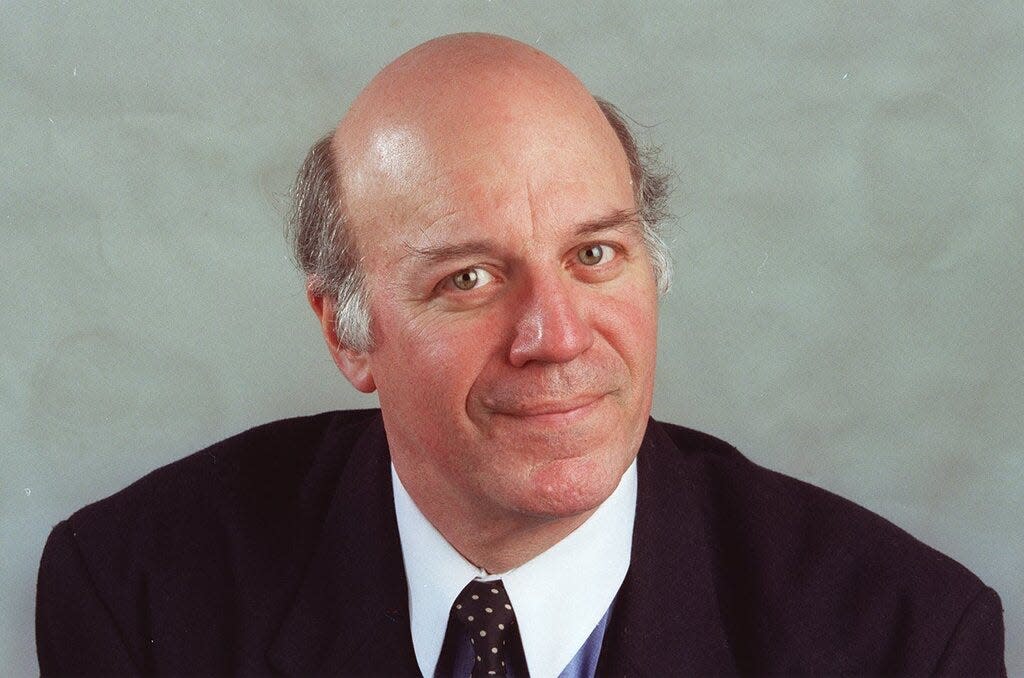Opinion/Brown: After a big loss, remembering why art teachers are so important

When school budgets get tight, art and music tend to take the first cuts. After a while, we might conclude that we don’t really need art — not like we need, say, physics. It’s just that the arts are one of humanity’s main ways of civilizing itself. And if it’s a school, the art room is where some of our gentlest and most civilized kids want to hang out.
I’m thinking of these things today because we recently lost an art teacher here. His name was DeWayne Stallings and we taught together for years at Cape Cod Academy. In his 33-year career, DeWayne graced four schools. Sturgis, and then CCA were his last.
Late one morning years ago, I had a free period and was correcting papers when there was a soft knock at my door. It was DeWayne, pushing a small cart into the room. On it was a small, but ornate, tea service, complete with two cups. Lemon … sugar … napkins. It was necessary, DeWayne explained, to set the ordinary business of the world aside for moments of civilizing grace. There were only two cups. This moment was ours.
More Opinion/Brown:: The FAIR Project offers a way back after serving time
I learned that DeWayne had a habit of doing this. If he’d heard that someone was having a hard time, or just when he found himself thinking of them, he’d set up a high tea and either invite them down to the art room — or show up with his cart. And it wasn’t just the tea or the unexpected formality of it. DeWayne had a knack for making you feel that there was nothing and nobody on his mind but you.
While adults certainly appreciated his approach, the primary beneficiaries were our kids. Students got invited to teas too. Sometimes an art class would show up in DeWayne’s room to find lots of cups and no agenda apparent. Time out for civilization, for being polite without being stuffy or fake. Understand, kids don’t need to be evaluated as much as they need to be seen. Every child, every day, needs to know that someone cares about them enough to notice, to get a sense of what the world is like — the one they inhabit themselves — and to care how that feels.
More Opinion/Brown: When faith trumps politics, there are dangers to democracy
It wasn’t only tea. Just before his graduation, a senior recalled a bad day he’d had in kindergarten. It was recess and he was sitting alone … maybe in tears. And this teacher he didn’t even know had somehow spotted his sadness and wandered over. It was DeWayne. He sat down and asked what was the matter. Maybe they talked quietly for five minutes, tops. The boy felt better and ran off to join his buddies. No big deal.
Here's what struck me at the time and why I remember it still. Thirteen years later, with all his excitement at graduation, this young man hadn’t forgotten this tiny act of kindness. He must have really needed it at the time. And from 30 yards away, DeWayne somehow knew that and showed up for him.
More Opinion/Brown: Lyla in Africa: a Cape 11-year-old goes on photo-safari
We seem painfully aware of how acts of cruelty leave wounds that bleed when touched, even years later. Acts of compassion heal us in the same way. And often they seem so insignificant that the authors of such kindnesses do them instinctively and don’t even remember it later. To feel the tear sliding down the face of someone turned away from us … that is a gift, maybe even a treasure. We lost a big chunk of that when cancer took DeWayne.
Of Dewayne’s artistic talents, the one he showed me was his mastery of miniatures. Some artists offer sprawling canvases that own a whole wall. That wasn’t his style. DeWayne’s paintings were often little bigger than a post-it note. You had to slow down and really look. When you did, you found that DeWayne knew how to store his treasures in very small rooms. He wasn’t trying to take you by storm; he was inviting you to tea. That’s why I loved him.
Art and compassion aren’t separate things. They weren’t with DeWayne. To begin with either one, we have to look. If we don’t look, we won’t see. If we don’t see, we won’t feel. If we don’t feel, we won’t act. And if we don’t act, nothing will change for the better. DeWayne Stallings never said this thing out loud; instead, he lived it. We’re all the poorer, now that he’s gone.
Lawrence Brown is a columnist for the Cape Cod Times. Email him at columnresponse@gmail.com.
This article originally appeared on Cape Cod Times: Cape Cod: Art teacher DeWayne Stallings was talented, compassionate

